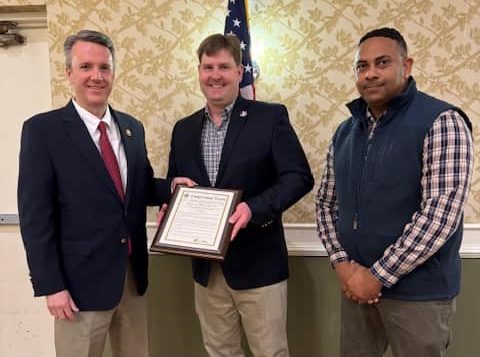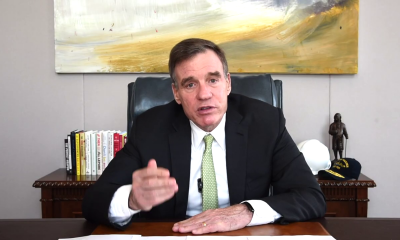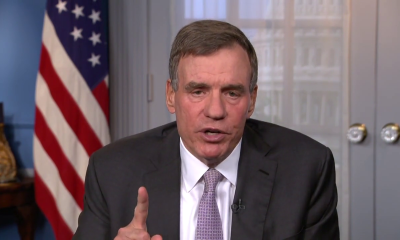Legislative Update
US Senator Mark Warner gives area update on American Rescue Plan
Following a multi-day swing through the Shenandoah Valley and Roanoke Valley, U.S. Sen. Mark R. Warner (D-VA) held a remote media availability to discuss what he heard from business owners, community leaders, and health experts regarding the American Rescue Plan and the much-needed support it will provide to end the COVID-19 economic and health crisis.
Signed into law last month, the American Rescue Plan includes robust funding to boost vaccination efforts, financial aid for struggling Virginia businesses, assistance for state and local governments, funding for broadband infrastructure expansion, and more.
Legislative Update
Sixth District Perspectives with Congressman Ben Cline – January 25, 2024

Last week, the House continued to struggle with the question of how to address our ballooning deficits while funding the core functions of the Federal government. While some wanted to kick the can down the road once again and pass a temporary funding bill with no restrictions, I joined many others who support addressing the crisis at our southern border. At the same time, we debated efforts to fund the government and avoid a shutdown. Also, in conjunction with the annual March For Life, the House passed legislation that prevents the Secretary of Health and Human Services from targeting pregnancy centers that serve new mothers and families. As always, meeting with folks back in the district and listening to how I can better serve them is a great pleasure. The battle against wasteful spending is ongoing, and I will continue to be mindful of the hard-earned tax dollars of the citizens of Virginia’s Sixth District.
Same Story, Same Outcome
With a national debt topping $34 trillion, grocery and gas prices skyrocketing, and many Americans priced out of the dream of home ownership, the massive overspending and resulting inflation at the core of “Bidenomics” is crushing working families. Yet rather than addressing this head-on, Congress passed another continuing resolution, the 20th such bill since I came to Congress in 2019. It has been 28 years since Congress met its obligation and passed all twelve appropriations bills in regular order.
Consistently passing continuing resolutions instead of going through the appropriations process is irresponsible and delays important discussions about funding priorities. Furthermore, the continuing resolutions being passed this year continue the Biden-Pelosi levels of government spending that were adopted under Democrat control and have left American families out in the cold. Virginia’s Sixth District did not elect me to go along with the broken system that has led to trillion-dollar deficits and massive debt. I will continue fighting to right the fiscal ship and restore order to our Federal budget.

Condemning Biden’s Open Border Policies and Safety Crisis
Under the Biden Administration, the southern border crisis has only worsened. Since Biden took office, 169 individuals on the terrorist watchlist have been apprehended attempting to cross the border illegally, and the CPB has seized 27,023 pounds of fentanyl. That does not consider those who escaped apprehension or the drugs smuggled in that were not detected. This has turned cities and towns across America into border communities, as the lack of enforcement by Secretary Mayorkas and President Biden has resulted in cities like New York riding schools into housing for illegal immigrants and forcing American children to stay home and learn remotely.
This betrayal of our laws and our Constitution by President Biden and his lackeys must end, which is why House Republicans are moving to impeach Secretary Mayorkas and this week adopted H. Res. 957, which condemns the Biden Administration’s open border policies, disregard of national security, and public safety crisis along our southern border, and urges President Biden to reverse course and secure our border.

Standing For Life
Last week, Washington, D.C., saw thousands of Americans of all ages brave the cold weather to condemn abortion in the annual March for Life. In support of the right to life and the protection of the unborn, House Republicans passed two critical pieces of legislation last week. H.R. 6918, the Supporting Pregnant and Parenting Women and Families Act, prevents the Secretary of Health and Human Services from unfairly targeting pregnancy centers that serve new mothers and families who choose life. We also passed H.R. 6914, the Pregnant Students’ Rights Act, which requires universities and higher education institutions to communicate and distribute information informing pregnant students of their rights, accommodations, and all resources available to them. The tragedy of abortion is one of the greatest human rights crises of our day, and we must continue to stand up and be a voice for the voiceless.

District Travels

It was great to attend the Roanoke Chapter of the Southern Christian Leadership Conference’s annual luncheon honoring the memory of Rev. Martin Luther King Jr.
Thank you for the opportunity to serve as your Congressman. If my office can ever be of assistance, please contact my Washington office at (202) 225-5431.
For the latest updates from Washington and across the Sixth District, please follow me on Facebook, Instagram, and Twitter for the latest updates.

Legislative Update
Sixth District Perspectives with Congressman Ben Cline – January 18, 2024

As the 118th Congress convenes Washington for the second year of the session, House Republicans are determined to pursue a responsible spending deal that cuts wasteful spending, secures our border, and returns money to the taxpayers. In more theater, Hunter Biden made a surprise appearance during his contempt hearing in the House Oversight Committee. As Congress prepares for the road ahead, I remain committed to fighting for our shared values in the Sixth District of Virginia.
America’s Broken Border
All across the country, Americans’ primary concern is the broken border that President Biden and Alejandro Mayorkas created. In the past three years, over 6.2 million encounters have been at our southern border. In December 2023, there were over 302,000 incidents of migrants attempting to cross the border. These failed policies have enabled fentanyl and other deadly drugs to pour into our communities, as well as criminal migrants to be released into the country with a low likelihood of removal.
Last week, the House Committee on Homeland Security, led by Chairman Mark Green (R-TN), conducted their first impeachment hearing of Alejandro Mayorkas and laid out the facts for Americans. While accountability for the broken border ultimately rests with the President, we must act to remove Secretary Mayorkas for violating his oath of office and encouraging the chaos we are seeing at the border right now. Impeaching Mayorkas is the first step, but we must continue to pressure the Senate to pass legislation such as H.R. 2, the Secure the Border Act, the strongest border security package in United States history.
“Bidenomics” Is Wrecking American Families
Last week, the latest Consumer Price Index (CPI), a key inflation index, reminded us that “Bidenomics” is not working for hardworking families. The report was “higher than expected” as it increased at an annual rate of 3.4%, and it is the 33rd straight month with inflation above three percent.
Despite the Biden Administration’s push for “Bidenomics”, the absolute truth is families have seen skyrocketing grocery and fuel bills and depletion of their savings accounts. To guarantee that hard-working taxpayers can keep more of their money, House Republicans are working daily to restore fiscal responsibility in Washington and revive our economy.
Hunter Biden’s Surprise Appearance on Capitol Hill
House investigators have continued to follow the facts into President Joe Biden’s involvement with his family’s business dealings for months. Instead of appearing for his deposition on December 13, 2023, Hunter Biden staged a media event on the Senate side of the U.S. Capitol, where he made a public statement without taking any questions. Then, this week, at the Oversight Committee’s markup of his contempt resolution, Hunter Biden pulled a publicity stunt, continued defying the orders, and appeared at his contempt hearing.
Hunter Biden believes that defying orders and executing publicity stunts will divert attention from the investigation into his family’s shady business dealings. However, the House Oversight Committee and House Judiciary Committee remain committed to uncovering the truth for the American people. No one, including the Biden’s, is above the law.
District Travels
For 90 years, the Salem Rescue Squad has displayed selfless sacrifice to the city of Salem as it stands as the second oldest all-volunteer rescue squad in the United States. It was an honor to present them with a commemorative plaque recognizing the squad winning the 2023 Volunteer EMS Service of the Year award at their banquet.

Thank you for the opportunity to serve as your Congressman. If my office can ever be of assistance, please contact my Washington office at (202) 225-5431.
For the latest updates from Washington and across the Sixth District, please follow me on Facebook, Instagram, and Twitter for the latest updates.

Legislative Update
Sixth District Perspectives with Congressman Ben Cline – December 27, 2023

The Christmas season is a special time for many folks across the Sixth District and throughout the Nation, and it serves as an important reminder of all the blessings God has given us, most importantly, the gift of His Son, Jesus Christ. This holiday season, may we all take a moment to express our gratitude to those who keep us safe and healthy, as well as our brave men and women in uniform, and think of those less fortunate among us. From my family to yours, Merry Christmas!
Wishing You and Yours a Very Merry Christmas
Our lives, country, and world are far from perfect. There are many challenges, struggles, and uncertainty we all face. However, the Good News is among us. This Christmas season, let us all remember the true meaning of Christmas: the birth of Our Lord and Savior, Jesus Christ, who came into the world to bring us hope, joy, and love.
Preventing Universities From Using Taxpayer-Funded Grants for Woke Programs
Universities are raking in tens of billions of tax dollars for scientific research. While some are using their grant money appropriately, others are using it as a slush fund for woke, radical Diversity, Equity, and Inclusion (DEI) initiatives.
It’s far past time universities get back to basics and stop pushing the Left’s political agenda on the taxpayers’ dime. That is why last week, I introduced the Federal Grant Accountability Act, which will ensure institutions of higher education are properly using these taxpayer dollars solely for conducting research projects rather than funding DEI activities. This legislation would require reports on how indirect cost reimbursements are being allocated to schools to provide more transparency to the federal grant-making process.
Fighting Against Waste and Abuse of Unspent COVID Funds
As the Chairman of the Republican Study Committee’s (RSC) Budget and Spending Taskforce, I sent a letter with RSC Chairman Kevin Hern (R-OK) to the Treasury Department demanding that they roll back a new rule that would allow state and local governments to hoard tens of billions in unspent COVID funds from the 2021 American Rescue Plan (ARP).
Under current law, state and local governments have until December 31, 2024, to “obligate” these COVID funds. Yet, instead of enforcing this statutory deadline, the Treasury Department’s new rule would allow state and local governments to use this money past the deadline. This will only further fuel inflationary and wasteful spending, and I’m fighting to stop it.
Recognizing the Hot Springs Rescue Squad’s 60th Anniversary
I was pleased to recognize the Hot Springs Rescue Squad on the House floor recently for 60 years of serving the people of Bath County. Since 1963, the Squad has been providing emergency medical services, conducting vehicle, search, and water rescues, along with treatment and transport for medical and trauma patients. We are incredibly grateful to all the volunteers for going above and beyond to help those in need, especially during the holiday season, and wish the Hot Springs Rescue Squad many more years of success.
Spreading Christmas Cheer in the District

I was pleased to participate in The Salvation Army’s Red Kettle Campaign in Roanoke and support those in need this holiday season.
Thank you for the opportunity to serve as your Congressman. If my office can ever be of assistance, please contact my Washington office at (202) 225-5431.
For the latest updates from Washington and across the Sixth District, please follow me on Facebook, Instagram, and Twitter for the latest updates.

Legislative Update
Warner YEARLY Wrap-Up: Bringing it Home for Virginia
Happy Holidays from the Warner press office. In a year of pure chaos and disorder in the House of Representatives, Sen. Warner soldiered on and found creative ways to get things done for Virginians amid challenging gridlock in the lower chamber. Where the House failed, Sen. Warner worked directly with agencies, raked in wins from previous laws, and enticed exciting new industry to the Commonwealth so Virginians could end the year with some major points on the board.
On that note, so many huge wins of past Congresses were implemented this year, unleashing huge investments and enacting big changes for Virginians. Laws that Sen. Warner authored or supported, including the bipartisan infrastructure law, CHIPS Act, Inflation Reduction Act, Bipartisan Safer Communities Act, PACT Act, and the American Rescue Plan continued to pay dividends thanks to Sen. Warner’s tireless advocacy for specific projects across Virginia.
And it wasn’t just in DC where Sen. Warner got stuff done – he met with constituents in every single region of Virginia to ensure he was hearing from and fighting for all Virginians. Watch a quick recap of one of his trips here.
Read all about it in your Warner YEARLY Wrap-up:
BRINGING INDUSTRY HOME TO VIRGINIA
- SCORING BIG FOR JLAB: After years of continuous engagement with federal, state, and local partners, Sen. Warner secured Jefferson Lab in Newport News as the location for the Department of Energy’s High-Performance Data Facility (HPDF). The HPDF is a new scientific user facility specializing in advanced infrastructure for data-intensive science… or, in simpler terms, a nationwide hub for cutting-edge scientific discovery that will leverage huge federal investments and bring great jobs to Hampton Roads. Over the next several years, the project will bring between $300 million and $500 million home to Jefferson Lab – a transformative initiative for the lab. It also fulfills a long-term goal to diversify the operations of JLab.
- TECH HUB: You may remember Sen. Warner’s advocacy for and passage of the CHIPS Act in 2022, seismic legislation to bolster America’s national security by onshoring the manufacturing of semiconductors and investing in research and development. This year, Sen. Warner secured a major benefit from the law for Virginia, as he won a Tech Hub designation for the Richmond-Petersburg region, meaning Virginia will be eligible for big investments to onshore prescription drug manufacturing. Currently, America relies on other nations for key portions of the pharmaceutical supply chain, making us dependent on foreign countries for indispensable medications. By bringing that supply chain back home, Americans will have cheaper medications and stronger national security.
- THE COMEBACK CITY: While we’re on the topic of big developments made possible by the CHIPS Act, Sen. Warner also secured a Tech Hubs Strategic Development Grant for the New River Valley and Danville. The grant will increase local coordination and planning activities to strengthen the region’s capacity to manufacture, commercialize, and deploy technologies critical to U.S. economic and national security.
- THE COMEBACK CITY COMES BACK: But that’s not all for Danville! Following years of engagement on this project by Sen. Warner, the Navy broke ground on a new regional training center for the Accelerated Training in Defense Manufacturing program in Danville. The new training facility will allow more students to enroll in accelerated four-month training programs to qualify for higher-paying jobs. Estimated to open by 2025, the Regional Training Center will graduate 800-1,000 students annually to fill critical vacancies across the defense industry. Following advocacy by Sen. Warner, this project also received $20 million from the Department of Defense.
- DULLES: After extending the Silver Line to Dulles in late 2022, Sen. Warner landed another big initiative for the airport this year: the largest-ever renewable energy project at a U.S. airport! In August, Sen. Warner broke ground on the historic agreement between Dominion Energy and MWAA, which will generate up to 100 megawatts (MW) of solar energy and store 50 MW of power, enough to power more than 37,000 Virginia homes.
- A SLAM DUNK FOR VIRGINIA’S ECONOMY: In December, Sen. Warner announced a seismic tentative agreement to bring the Washington Capitals and Washington Wizards home to a new arena in Alexandria. The new entertainment complex would be located around the brand new Potomac Yard Metro stop (more on that later…) and could bring in over $7 billion in economic impact for the Commonwealth and generate over 30,000 new jobs. While Sen. Warner is supportive of this tentative agreement, he simultaneously has been strongly advocating for a detailed transportation plan to support the area, along with plenty of outreach to surrounding communities and local leaders so all stakeholders are on board and ready to make this project a success.
- FIGHTING FOR THE FBI: After a lot of hard work making the case that Virginia is the best possible home for the FBI, credible allegations of bias in the selections process forced Sen. Warner to request an investigation into the decision-making process. After his calls, the Inspector General of the GSA initiated a full investigation into the site selection process.
TRANSPORTATION & INFRASTRUCTURE
- LONG BRIDGE OVER WELL-FUNDED WATERS: Years of work by Sen. Warner – from passing the Long Bridge Act to an earlier investment of $20 million for a pedestrian-bicycle bridge to the passage of the bipartisan infrastructure law – culminated in a $729 million investment for the Transforming Rail in Virginia: Phase 2 project. The funding will support the completion of a new Long Bridge across the Potomac River to connect D.C. and Virginia, make improvements to L’Enfant Station, and lay a third track along key sections of the corridor in Prince William, Stafford, and Spotsylvania counties. This will help alleviate current bottlenecks, expand capacity, and improve reliability for Virginia commuters, travelers, and freight. The completion of the Long Bridge project will double rail capacity across Virginia, so Sen. Warner also announced $2 million to plan for the future of rail in Virginia by studying the potential to extend Amtrak service to Bristol, increase frequency on existing routes, and invest in a more efficient route between Virginia and North Carolina.
- POTOMAC YARD: In May, Sen. Warner celebrated the opening of the Potomac Yard Metro stop, Metro’s 98th station. The opening of Potomac Yard will connect the rest of the Metro network to a Virginia Tech Innovation Campus, the potential future home of the Capitals & Wizards, and a large retail center.
- MIND THE GAP: Sen. Warner announced a $143 million TIFIA loan to address a major traffic chokepoint in Hampton Roads by widening I-64 and adding a 12-foot-wide travel lane in each direction from exit 267 to exit 265. The eastbound Hampton River bridges will be replaced, and the westbound Hampton River Bridge will be widened and rehabilitated.
- RAISING THE BAR: Sen. Warner’s bipartisan infrastructure law made historic investments to grow the RAISE program. This allowed Sen. Warner to announce a few huge RAISE grants this year: $23.3 million for Northampton and Accomack Counties to support the conversion of 16.8 miles of abandoned Bay Coast Railroad into a 10-foot-wide shared-use path that will connect the Town of Nassawadox with several historic towns on the way to the Town of Olney. $14.4 million to transform Harrisonburg’s downtown by converting a lane of US-11 into a two-way separated bicycle area and also constructing a shared use path along Main Street. The project will also make many safety improvements for pedestrians and cyclists.
- BUS-Y BODY: Courtesy of the infrastructure law, Sen. Warner secured a $171 million grant from the Federal Transit Administration to secure new low- or no-emission buses for the Commonwealth. WMATA, Alexandria, Loudoun County, Hampton Roads, and the Virginia Department of Rail and Public Transit all received a portion of this funding.
- INVESTING IN AIRPORTS: Also courtesy of the infrastructure law, Sen. Warner announced $61 million to improve Virginia’s airports.
- HOLY CVOW: Sen. Warner secured Department of the Interior approval of the construction and operation of the Coastal Virginia Offshore Wind (CVOW) project, a key approval within the larger project. This $10 billion project, located off the coast of Virginia Beach, will be the largest commercial-scale offshore wind project in America and will provide approximately 2.6 gigawatts of clean energy, capable of powering over 650,000 homes.
- THE WINDY CITY: Related to that approval, Sen. Warner also secured $39.3 million to support the Norfolk’s Fairwinds Landing project, which will convert an existing marine terminal and berth to an offshore wind logistics facility to support the CVOW project and other offshore wind projects across the Mid-Atlantic.
- ATLANTIC WATERWAY: Sen. Warner secured $22.4 million for the Atlantic Intracoastal Waterway Bridge Replacement at Deep Creek in Chesapeake – a longstanding top priority for the city. This represents full funding for the project, and allowed the Norfolk District to issue the final contract to prevent further delay and increased costs. The project will replace the federally-owned Atlantic Intracoastal Waterway Deep Creek Bridge -– a functionally obsolete, two-lane, 20-foot-wide, single-leaf bridge –- with a 144-foot-long, 60-foot-wide, five-lane, dual-leaf drawbridge.
- PREVENTING FLOODING: Sen. Warner secured $3 million for the Peninsula Regional Flood Risk Management feasibility study. This study will investigate flood risk threats from sea level rise, coastal storm surge, and rainfall, and develop watershed-based mitigation solutions to reduce flood risk in Hampton and across Hampton Roads. This funding will allow work on the study to commence immediately.
- DEEP CONVERSATIONS: Sen. Warner successfully secured $100,000 to restart work on the Elizabeth River and Southern Branch Deepening project. The project will deepen the 40-foot channel of the Elizabeth River and Southern Branch to 45 feet and 42 feet, and a portion of the 35-foot channel on the Southern Branch to a depth of 39 feet. Deeper channels will allow vessels to fully load commodities – including American agricultural and energy products – that move in and out of the waterway.
BUILDING AN ECONOMY THAT WORKS FOR ALL & SAVING VIRGINIANS $$$
- CDFIs HIT A MILESTONE: Sen. Warner has spent the last several years as a tireless champion of Community Development Financial Institutions (CDFIs) and Minority Development Institutions (MDIs), mission-driven financial institutions that get capital to underserved communities. Following his past leadership in securing federal investments on a bipartisan basis through the Jobs and Neighborhood Investment Act, which made a historic $12 billion investment in CDFIs and MDIs, Sen. Warner redoubled his efforts in 2023 and announced – alongside Community Development Financial Caucus Co-Chair Sen. Crapo (R-ID) and Deputy Secretary of the Treasury Wally Adeyemo – that members of the Economic Opportunity Coalition had reached their goal of securing $1 billion in committed deposits in CDFIs and MDIs in order to expand their lending power for underserved communities and small businesses emerging from the pandemic.
- CASH FOR VIRGINIA CDFIs: Through the Treasury Department’s CDFI Program, Sen. Warner secured $10,035,800 in federal funding to support Virginia CDFIs in Arlington, Roanoke, Falls Church, Christiansburg, Richmond, Charlottesville, and Petersburg.
- BIG MONEY FOR AFFORDABLE HOUSING: Throughout the year, Sen. Warner secured $98.3 million in federal funding for affordable housing, community development, and homelessness assistance in Virginia and also $54.1 million in federal funding to improve affordable housing through HUD’s Capital Fund.
- TURKEY DAY: For poultry producers across the Commonwealth, Sen. Warner successfully pushed the U.S. Trade Representative to secure an agreement with India to reduce the tariff on turkey from 30 percent to 5 percent. This allows Virginia turkey producers to compete in the rapidly expanding market for turkey while providing Indian consumers with a high-quality and affordable source of protein.
- PROMOTING CDFIS: In May 2023, Sen. Warner urged the EPA to ensure that investments through the Greenhouse Gas Reduction Fund (GGRF), a provision of the Inflation Reduction Act, prioritized applicants including CDFIs, green banks, and MDIs. The July 2023 Notice of Funding Opportunities for the GGRF incorporated all items requested by Sen. Warner.
- SVB: In the wake of the collapse of Silicon Valley Bank, Sen. Warner asked the Treasury Department to take actions including identifying specific risks to financial stability in the areas of bank liquidity and sources of funding, among other things. Treasury responded by detailing specific interventions to manage systemic risks and diminish the chances of further bank runs.
FOR HEALTH CARE
- LOWERING HEALTH CARE COSTS: Sen. Warner proudly supported last year’s Inflation Reduction Act. The seismic law contained several provisions that went into effect this year to lower Virginians’ health care costs. It extended pandemic-era subsidies for Affordable Care Act premiums, meaning 300,000 Virginians covered under the ACA didn’t see a spike in their monthly payments. Thanks to the IRA and state-level action, Virginia saw the largest premium decreases for 2023 of all 33 states that participate in the federal marketplace. Virginians currently have the fifth-lowest health premiums in the nation. Starting on Jan. 1, 2023, the IRA capped insulin at $35/month for those on Medicare, benefitting almost 75,000 Virginians. After this provision went into effect, several huge insulin manufacturers caved to the pressure and lowered costs for all. Sen. Warner’s guest for this year’s State of the Union was Fredericksburg senior Marguerite Bailey Young, who saw her costs for insulin drop dramatically thanks to Sen. Warner’s championing of the law. Also starting Jan. 1, all adult vaccinations recommended by the ACIP became free for those on Medicare, including the shingles vaccine. Over one million Virginia senior citizens are now able to get their shingles vaccine totally free of charge. The IRA also contained a historic provision to allow Medicare to negotiate prescription drug costs for the first time in history. In August, Medicare announced the first ten drugs that would be eligible for negotiation, and in October, Sen. Warner celebrated the announcement that all 10 drug manufacturers agreed to participate. Now that the negotiations are under way, the first set of negotiated prices will go into effect on Jan. 1, 2026.
- LET’S GET FLEXIBLE: Following Sen. Warner’s repeated and direct advocacy to the DEA to ensure that patients can continue to access critical telehealth flexibilities, the DEA announced they would extend current telemedicine prescription regulations through the end of 2024 while they formulate a plan for long-term regulation.
- SUPPORTING HOSPITALS: Sen. Warner pushed Medicare to extend a rule that increased reimbursements for hospitals with lower labor costs (primarily hospitals in rural communities). In August, Medicare announced a plan to do just that, making sure that at least 15 rural hospitals across Virginia – many of which struggle to keep their doors open – continue to receive increased reimbursements.
- CRACKING DOWN ON JUNK PLANS: Following Sen. Warner’s express advocacy to have the Department of Health and Human Services (HHS) limit “junk” plans (health insurance plans that don’t provide comprehensive health and consumer protections), HHS proposed a rule to crack down on these plans. Sen. Warner joined with his colleagues to push the Biden admin to quickly finalize this proposal.
- BRING YOUR PET (SCAN) TO WORK: There’s a promising new class of drugs to treat Alzheimer’s, but in order to prescribe these drugs, doctors require both an Alzheimer’s diagnosis AND evidence of amyloid buildup (a protein that forms brain plaque). There are two ways to test this – through a laborious and painful spinal tap or a less invasive amyloid PET scan. Previously, Medicare only allowed one such PET scan in a senior’s lifetime, but after direct advocacy from Sen. Warner, they announced in October that they would remove this once-per-lifetime restriction, allowing more seniors to know more about their health and access these drugs.
- COMPREHENSIVE CARE: Sen. Warner cosponsored the Comprehensive Care for Alzheimer’s Act, which would have the Center for Medicare and Medicaid Innovation (CMMI) test a comprehensive care model for individuals with Alzheimer’s disease and their families. In July, Medicare announced that CMMI will test a new model which parallels many aspects of the bill and aims to improve quality of life for people living with dementia, reduce strain on unpaid caregivers, and help people remain in their homes and communities.
- PROTECTING SENIORS FROM SCAMS: Following an uptick in deceptive marketing practices by Medicare Advantage (MA), Sen. Warner joined a letter to Medicare stressing the urgent need to put additional consumer protection policies in place. In April of this year, Medicare announced a plan to do so, ensuring that seniors see less confusing and deceptive MA imagery, and increasing access to accurate information about Medicare coverage.
- REPRODUCTIVE CARE: Following the unprecedented Dobbs decision that terminated the federal right to an abortion overnight, Sen. Warner has been a consistent advocate to expand access to comprehensive reproductive care. This year, he pressed HHS to strengthen health care privacy protections under HIPAA so providers cannot share patients’ sensitive reproductive health information with law enforcement. Following that push, HHS issued a proposed rule to strengthen HIPAA protections, safeguarding sensitive information and helping health care providers give complete and accurate information to patients. Additionally, you may have seen coverage of the case before the Supreme Court to curtail access to mifepristone, a drug used in over half of abortions nationwide. Sen. Warner has been pushing for SCOTUS and lower courts to preserve access to mifepristone in a series of amicus briefs.
- MEDICAL GRAB BAG: While House Republicans have stubbornly refused to pass a full spending bill until 2024, the Senate has advanced several of Sen. Warner’s provisions for consideration… so they’re ready whenever the House decides to do its basic duty and legislate! The provisions include reauthorizing the Special Diabetes Program (SDP), extending funding for outreach to help low-income seniors enroll in Medicare, holding pharmacy benefit managers(PBMs) accountable to provide better values for patients, requiring Medicare to conduct listening sessions about improvements to Medicare Part D, providing new sources of funding for childhood cancer research, requiring HHS to survey specialty pharmacy drug acquisition costs, removing burdensome ACA reporting requirements, renewing important programs to study a cure for Alzheimer’s, and addressing impending cuts to hospitals that treat a disproportionate share of uninsured and underinsured patients.
FOR LABOR AND FEDERAL WORKERS
- CRACKING DOWN ON CHILD LABOR: Following a deeply disturbing article about child labor violations in Virginia, Sen. Warner pushed Acting Secretary of Labor Julie Su to hold companies accountable to the fullest extent of the law for violations of child labor laws. After this letter, the DOL enhanced penalties for violations by calculating penalties per violation of child labor laws, instead of on a per child basis, and by requiring officials calculating penalties to consider the gravity of the violation in additional to the size the company, meaning a company will not have their penalty reduced just because of their size.
- SELF EXPRESSION: After Sen. Warner sent a letter to OPM and the Office of Special Counsel (OSC) requesting guidance on the self-expression rights of federal workers as related to the conflict and humanitarian crisis in Gaza, the OSC released guidance clarifying that federal employees speaking out on this issue in their personal capacity would not be violating the Hatch Act – giving federal workers certainty that they can continue to exercise their first amendment rights without jeopardizing their jobs.
- YOU DESERVE A RAISE: After Sen. Warner cosponsored legislation that would significantly increase pay for federal workers, President Biden announced his plan to increase their pay by an average of 5.2% in 2024.
- PROTECT CIVIL SERVANTS: Sen. Warner introduced the Saving the Civil Service Act, legislation that would secure the civil service and protect tens of thousands of federal employees from losing job protections and due process rights in the event a future president proposes an idea like Schedule F as then-President Trump proposed. Following this lead, OPM released a proposed rule aligned with the protections Sen. Warner endorsed.
FOR STUDENTS
- HOLDING THE IRS ACCOUNTABLE: In 2019, Sen. Warner passed a bipartisan law that extended tax credits to businesses that helped employees pay back their student loans. However, participation has been low due to a lack of awareness and resources, so Sen. Warner pressured the IRS through public questioning and a subsequent letter, which resulted in the agency providing many more resources on Section 127’s educational assistance benefits.
- JUSTICE FOR BORROWERS: In 2022, Sen. Warner passed a bipartisan law to help victims of exploitative joint consolidated loans, which the Department of Education has yet to fully implement. Following pressure by Sen. Warner, the Department created an issue-specific website and also provided guidance to student loan servicers in issuing administrative forbearance. Sen. Warner will continue to advocate for the federal resources and attention needed for full implementation of his common sense law.
- COMBATING ISLAMOPHOBIA AND ANTI-SEMITISM: After meeting with community members regarding the war in Gaza, Sen. Warner urged the Department of Education to combat the rising wave of antisemitism and Islamophobia on college campuses. The Department has since issued information and resources to higher educational institutions on this topic.
FOR ANIMAL WELFARE
- PROTECTING EQUINE INTERESTS: Horse soring is a terribly inhumane practice that involves abusing horses to give them a high-stepping gait. Following many years of advocacy by Sen. Warner to end this inhumanity, the USDA announced a proposed rule to strengthen Horse Protection Act (HPA) requirements.
FOR NATIONAL SECURITY
PLAYING DEFENSE: In December, Congress passed the annual defense bill, which supported our military and Intelligence Community with new policies and targeted funding.
- For tech readiness, Sen. Warner secured an amendment to improve data and transparency around the Department of Defense’s investments into AI and related technologies.
- For the Virginia National Guard, Sen. Warner fought to include $20 million for one of the their top priorities – a new aviation hangar at the Sandston National Guard site.
- For Richmond, Sen. Warner secured the authorization for the planning and design of a 200-member Army Reserve Center (ARC) Training Building.
- For national and economic security, Sen. Warner’s American Security Drone Act will prevent federal dollars from being spent to procure or operate drones from countries of concern, such as China.
- For the Intelligence Community, the law contains the Intelligence Authorization Act, legislation authored by Sen. Warner to authorize funding, provide legal authorities, and enhance congressional oversight for the Intelligence Community (IC). This year’s IAA specifically increases oversight of national security threats from China, establishes new requirements for reporting and investigating allegations of sexual assault and sexual harassment with the CIA, and continues to drive improvement in the security clearance process. Read more about the full provisions of the bill here.
- For servicemember pay, Sen. Warner supported a 5.2 percent pay raise for military servicemembers and Department of Defense (DoD) civilian workforce – the largest raise in two decades.
- For servicemember housing, the law improves living conditions for enlisted servicemembers by greenlighting improvements to the quality and oversight of barracks.
- For military construction, the law authorizes $16.7 billion for military construction projects, including $570 million for 20 military construction projects in Virginia, and it authorizes the Navy to enter into contracts for the multiyear procurement of the next block of 13 Virginia-class submarines.
- MINERALS ARE CRITICAL: In October, Sen. Warner convened a bipartisan, unclassified roundtable discussion on critical minerals financing. The roundtable brought together key industry leaders, U.S. government officials, and Senators to discuss how the U.S. can unlock investment in and operations of critical minerals projects in the U.S. and abroad to meet exponential demand increases for these minerals and reduce our dependence on China. Chairman Warner then introduced legislation with Sen. Cornyn (R-TX) on critical mineral reforms.
- WORKING HARD FOR SMRs: In April, Sen. Warner convened a bipartisan unclassified roundtable on the national security imperative to deploy Small Modular Reactors (SMRs) domestically to outcompete our adversaries and secure our critical infrastructure with reliable power. In addition to some of the provisions listed in the NDAA section, the IAA included multiple provisions related to this goal, including requiring the IC to identify which of its energy needs could be served by SMRs.
- COUNTERING OBSTRUCTION: After Sen. Tuberville’s politically motivated blockade of military promotions, Sen. Warner sponsored a bill that passed the Senate which would grant retroactive pay, allowances, benefits, and seniority for servicemembers whose promotions were postponed.
- VETERAN MENTAL HEALTH: In 2020, Sen. Warner sponsored and passed a law that authorized the VA to conduct more suicide prevention outreach. In 2023, that grant program delivered over $2.8 million to organizations that operate in Virginia and other states.
- HONORING OUR PACT: In 2022, Sen. Warner fought to pass the seismic Honoring our PACT Act, which expanded presumptions of care for toxic-exposed veterans. As of this month, veterans in Virginia have submitted more than 50,000 new claims under the expanded PACT Act eligibility.
FOR MINERS AND APPALACHIAN COMMUNITIES
- BENEFITS FOR MINERS: Sen. Warner has repeatedly pushed for the U.S. Government Accountability Office (GAO) to complete a comprehensive study of the efficacy of all disabled miner benefits, both through direct advocacy to the GAO and by reintroducing the Relief for Survivors of Miners Act. In March, GAO acquiesced to Sen. Warner’s requests and announced they would conduct the study. The results will help federal stakeholders improve miners’ benefits programs to better meet the needs of Southwest Virginia’s coal mining communities.
- PROTECTING MINERS FROM SILICA DUST: For years, Sen. Warner has been pushing to tighten standards around miners’ exposure to silica dust, a toxic substance that puts miners at high risk of black lung disease. Following this advocacy, the Department of Labor announced a proposed rule to lower the legal exposure limit to respirable silica.
- SUPPORTING SUSTAINABLITY: Sen. Warner secured $500,000 from the Appalachian Regional Commission to support Virginia Tech and Appalachian Sustainable Development as they develop a plan to accelerate forest farming and grow the non-timber forest product industry in Central Appalachia. The planning grant will help establish a plan that examines the economic viability of individual and collective forest farming business ventures across Southwest Virginia and Central Appalachia, growing local economies and creating jobs.
FOR FOREIGN POLICY AND IMMIGRATION
- GOING AUMF: Sen. Warner sponsored a bipartisan bill that passed the Senate that terminated the two Authorizations for Use of Military Force for the 1991 and 2002 Gulf and Iraq Wars.
- RESOLVING TO HELP ISRAEL: In response to the Oct. 7 terrorist attacks, Sen. Warner cosponsored numerous resolutions that passed the Senate, including a resolution standing with Israel and condemning the attacks by Hamas, and a resolution that called on the Biden administration to continue doing everything in its power to free Israeli hostages.
- HAMAS FINANCING: In October, Sen. Warner urged the Treasury Department to take swift and decisive action against the use of cryptocurrency to finance terrorist organizations, particularly Hamas and Palestinian Islamic Jihad. In direct response, Treasury took a number of actions to crack down on the issue, including a proposed rule identifying crypto mixers as a primary money laundering concern. Sen. Warner also introduced bipartisan legislation to crack down on terrorist organizations like Hamas by applying sanctions to foreign parties that facilitate financial transactions with terrorists.
- SETTLERS OF THE WEST BANK: Sen. Warner called on the Biden administration to address the alarming rise in settler violence in the West Bank. Shortly thereafter, Biden announced visa bans targeting settlers who have committed acts of violence. Building on that effort, Sen. Warner also sounded the alarm about the economic deterioration in the West Bank and the troubling rise in violent acts perpetrated by extremist Israeli settlers. In a subsequent letter to President Biden, he stressed the need for Israel to take steps to address the growing instability in the West Bank, including by ensuring that the Palestinian Security Forces are able to ward off violence against innocent Palestinian civilians and prevent further destabilization.
- CYBERSECURITY IS PATIENT SAFETY: Last year, Sen. Warner released a comprehensive white paper highlighting steps that must be taken to bolster cybersecurity in health care. It must have made its way to the Department of Health and Human Services (HHS), because HHS subsequently released a roadmap of policies it will pursue on this topic including concerns raised directly by Sen. Warner, such as increasing enforceable cyber requirements for health care providers and making it easier for providers to seek assistance from HHS.
- PROTECTING SUDAN: Following the eruption of violence in Sudan, Sen. Warner held a virtual town hall with impacted constituents and led efforts to secure a new Temporary Protected Status (TPS) designation for the country, protecting Sudanese nationals in the U.S. from being forced to return to a dangerous situation. He also applauded an extension of TPS for Sudanese Americans over the summer and in December.
- FIGHTING FOR TPS: Due to the humanitarian crises in Venezuela and Nicaragua, Sen. Warner pushed for the Biden administration to preserve TPS for the countries. In response, President Biden extended TPS for Nicaraguans and also extended and redesignated TPS for Venezuelans.
FOR BROADBAND AND TECHNOLOGY
- BEAD ME UP, SCOTTY: When Sen. Warner wrote and passed the infrastructure law, he created the Broadband Equity, Accessibility, and Deployment program to close the digital divide. Courtesy of that program, NTIA announced that Virginia would receive $1.4 billion to expand broadband access, the seventh-highest total of any state.
- YOU’RE SO CHALLENGING: Why was that allocation so high? Partially because Sen. Warner led a push to ensure that Virginians submitted challenges to the broadband maps used to calculate Virginia’s allocation. In the end, the FCC conceded about 80,000 locations, resulting in approximately $250 million in additional funding for Virginia’s broadband efforts.
- EXPANDING AI COMMITMENTS: In July 2023, seven major technology companies signed onto a set of voluntary commitments to beef up security and transparency around AI. Sen. Warner made direct appeals to several companies that did not participate, and as a result, two companies, Scale AI and Stability, agreed to sign on to the agreement in September.
- GROWING THE AI WORKFORCE: In September 2023, Sen. Warner wrote to President Biden about the need to boost the federal government’s tech workforce to address the challenges of rapidly advancing AI. Subsequently, President Biden created the AI and Technology Talent Task Force to “accelerate and track the hiring of AI and AI-enabling talent across the federal government.”
- PER-FEC-T: After Sen. Warner pushed the FEC to regulate the deceptive use of AI in election-related communications, they reversed course on previous actions and did as Sen. Warner asked. Sen. Warner continues to lead in the AI space, and also recently introduced two bipartisan bills that would establish additional AI guidelines for the federal government and require financial regulators to address uses of AI-generated content that could disrupt financial markets.
- ORAN YOU GLAD HE GOT THIS DONE: Sen. Warner drafted and championed the Utilizing Strategic Allied Telecommunications Act, which was included in the CHIPS Act and included $1.5 billion to promote advancements in wireless technologies. Two Virginia recipients were included in the first tranche of grant awards, with Booz Allen Hamilton winning $2 million to advance OpenRAN security and Virginia Tech receiving $2 million for using AI to evaluate OpenRAN technologies.
- GREAT SCOTT: Following letters of support from Sen. Warner, Scott County Telephone Cooperative received two big grants to expand broadband coverage in the Commonwealth – $25 million from USDA’s ReConnect Program and $20.4 million from NTIA’s Middle Mile Broadband Infrastructure Grant Program.
FOR THE JUDICIARY AND PUBLIC SAFETY
- DO JUDGE ME: Sen. Warner recommended and confirmed two judges for the federal bench in Virginia – Judge Jamar Walker for the Eastern District of Virginia and Judge Robert Ballou for the Western District of Virginia (WDVA), and voted to confirm 66 additional judges for federal courts across the country. He also recommended two new candidates to President Biden for an additional vacancy in the WDVA.
- IMPROVING ASHANTI ALERTS: Following direct advocacy by Sen. Warner, Virginia updated its Ashanti Alert policies to require that Virginia State Police proactively contact local police or sheriffs’ departments whenever a missing persons report is filed to ask whether that department is requesting an alert.
CASEWORK – BY THE NUMBERS
Each year, Sen. Warner’s office assists thousands of Virginians in navigating federal bureaucracy. Let’s take a look at the numbers:
- Messages completed (letters sent, telephone calls made, etc.): 29,177
- Cases closed: 5,464
- Total agency funds returned to Virginians: $49,175,404.76. This includes:
- Internal Revenue Service: $47,541,153.88, including $31,178,416.70 from the Employee Retention Tax Credit. This accomplishment is particularly meaningful, not only because of the huge sum returned, but also because it embodies both top-down and bottom-up work by Sen. Warner. Previously, there was a major backlog on processing these payments, so Sen. Warner directly pressed on IRS Commissioner Werfel to address it. Following that intervention, there was finally action from the IRS to address the backlog, allowing Sen. Warner’s casework team to directly help more Virginians.
- Office of Personnel Management: $402,864.33
- Veterans Association: $383,346.99
- Department of Defense: $375,609.35
- Social Security Administration: $241,311.92
- Thrift Savings Plan: $165,300.00
- Treasury: $27,782.90
- Health and Human Services: $17,486.85
- Consumer Financial Protection Bureau: $10,321.90
- Department of Agriculture: $10,226.64
But that’s not all… here are a couple more highlights from a busy year in casework:
- Immigration: Sen. Warner’s team assisted hundreds of Virginians with immigration issues, and got 472 expedites approved, 95 green cards issued, 54 work permits issued, 38 oath ceremonies scheduled, 19 asylum interviews, and more.
- Passports: This is another issue where Sen. Warner worked both top-down and bottom-up to help Virginians. Over the summer, the State Department experienced a profound passport processing backlog caused by a surge in renewals and some internal issues. During this period, Sen. Warner met directly with the State Department to press for action and publicly continued pushing for action. Within a few months, they had returned to normal processing times.
- Additionally, Sen. Warner’s office also helped constituents in dire passport delays, successfully helping 96% of the 2,286 constituents that approached them with serious issues. This allowed Virginians to travel to at least 118 different countries and territories across the world!
- Communicating with all constituents: Sen. Warner’s mail team responded to 34,947 pieces of individual mail and 426,379 pieces of campaign mail (mail generated by constituents using automatic functionality).
- Helping folks in the Middle East: Following the Oct. 7 terrorist attacks, Sen. Warner’s team provided relevant information to over 30 Virginians/family members of Virginians in Israel to help them make informed decisions about departure opportunities. Additionally, the team worked to assist 5 Palestinian-American dual nationals and one Palestinian wife of an American leave Gaza through the Rafah crossing.
YEAR AHEAD
From all of us in the Warner Press Office, Happy New Year! Here’s to more progress for the greatest Commonwealth in the nation next year… and, hopefully a functioning House of Representatives, too!
Legislative Update
GOP Lawmakers Challenge Treasury on COVID-19 Fund Management
Congressional Letter Demands Rollback of Rule Extending Use of ARP Funds.
WASHINGTON, D.C. – In a bold move, Congressman Ben Cline (R-VA), Chairman of the Republican Study Committee’s (RSC) Budget and Spending Task Force, along with RSC Chairman Kevin Hern (R-OK), and 34 other Congressional members, have sent a strongly-worded letter to U.S. Treasury Secretary Janet Yellen. The correspondence demands the Treasury Department withdraw an Interim Final Rule (IFR) that extends the use of unspent COVID-19 funds from the 2021 American Rescue Plan (ARP).
The IFR allows state and local governments to obligate COVID funds past the original December 31, 2024, deadline by submitting a spending plan by April 30, 2024. This rule has been criticized by the GOP lawmakers for failing to comply with congressional statutes and potentially leading to further inflation and wasteful government spending.
Brittany Madni, Executive Vice President of the Economic Policy Innovation Center (EPIC), echoed these concerns. EPIC supports the letter, asserting that the Biden Administration’s handling of the Coronavirus State and Local Fiscal Recovery Fund (SLFRF) reflects government waste and a critical opportunity for taxpayer savings. The EPIC criticizes the Treasury’s new Hoarding Rule for allowing states to reserve funds for later unspecified uses.
The letter lists examples of what the signatories consider inappropriate uses of SLFRF funds, ranging from golf course improvements to funding for sports stadiums and entertainment venues. The GOP representatives argue that such expenditures stray from the fund’s original purpose of supporting COVID-19 response and recovery.
As the Biden Administration approaches its final year of the first term, the letter raises questions about the political deployment of these funds. With approximately $152 billion of the SLFRF still unobligated, the letter urges the Treasury to exercise care in managing the program.
The lawmakers also claim that the Treasury’s actions violate the Anti-Deficiency Act (ADA), which prohibits the department from expending and obligating funds inconsistently with Congress’s direction. The letter demands an immediate explanation or withdrawal of the regulations.
The signatories conclude that increased oversight of the Executive Branch’s use of emergency COVID-19 funding is imperative. They argue that the SLFRF program, in particular, requires more scrutiny and accuse the Biden Administration and Treasury of mismanaging and unlawfully expanding the program for political purposes.
This letter signifies a significant challenge from Congressional Republicans to the Treasury Department’s handling of COVID-19 funds. The outcome of this dispute could have far-reaching implications for the management of federal emergency funding.
Full letter here.
Legislative Update
Congressman Cline Proposes Accountability for Use of Federal Grants in Universities
New Bill Seeks to Curtail Funding of DEI Programs with Taxpayer Money.
WASHINGTON, D.C. – Congressman Ben Cline (R-VA) has introduced a significant piece of legislation, the Federal Grant Accountability Act, aimed at ensuring higher education institutions use federal grant money exclusively for research projects. The bill emerged in response to concerns over the use of taxpayer-funded grants for Diversity, Equity, and Inclusion (DEI) initiatives within universities.
This legislative move follows testimonies from university presidents about the growing issue of antisemitism on college campuses. The hearings, held by the House Education and Workforce Committee, revealed that while some universities are judiciously utilizing grants for scientific research, others are channeling these funds into DEI activities.
Under the new bill, universities would be required to report the allocation of indirect cost reimbursements, providing transparency in the federal grant-making process. The Act also seeks to limit federal agencies from distributing funds at an indirect rate higher than the lower rate offered to private organizations.
Congressman Cline emphasized the importance of safeguarding taxpayer dollars. He expressed concern over universities using grant money as a “slush fund” to promote what he terms “woke, radical DEI activities,” diverting from the intended purpose of supporting legitimate, research-oriented projects.
Ryan Walker, Executive Vice President of Heritage Action, supported Cline’s stance. He highlighted that higher education should focus on driving research and fostering diversity of thought rather than complying with political agendas. According to Walker, DEI practices, as currently implemented, contribute to division rather than inclusivity, with university bureaucrats exploiting these practices at taxpayers’ expense.
Background information sheds light on the funding model for academic research. Since 1946, taxpayers have subsidized scientific research at higher education institutions. The costs of these research projects include both direct costs and overhead expenses, the latter known as indirect costs. While direct costs are straightforward to quantify, indirect costs are more nebulous. Universities can currently receive reimbursements from federal agencies based on a negotiated indirect cost rate, sometimes as high as 60 percent of the direct costs. This has led to concerns that such funds could be diverted from their intended research purposes.
The Federal Grant Accountability Act represents a crucial step towards ensuring that federal grants allocated to universities are used appropriately. As the debate over the funding of DEI programs with taxpayer money continues, this bill highlights the need for transparency and accountability in the allocation of federal funds for higher education.
Read the full bill text here.

























































































